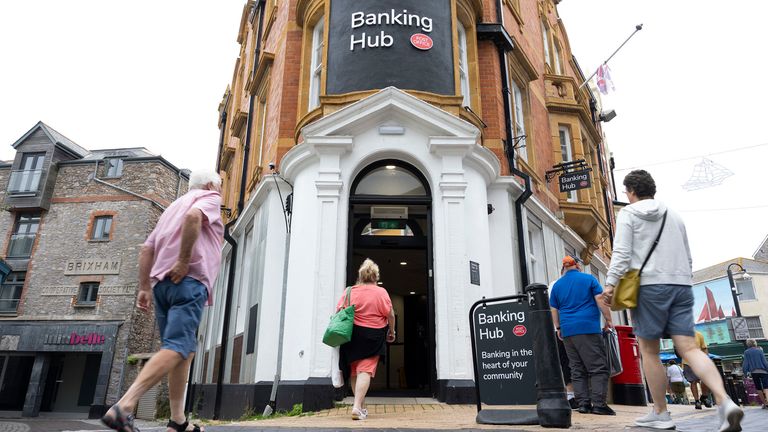Efforts to secure access to cash for consumers and businesses are being stepped up through a series of new rules to be imposed by the City watchdog.
The Financial Conduct Authority (FCA) said that from 18 September, banks and building societies would face greater obligations to weigh if local communities lack access to services, like branches and ATMs, and to plug “significant gaps”.
The new obligations would require them to act if assessments, which can be requested by local areas, find difficulties in the provision of basic services including the ability to bank cash.
Lenders would also have to keep a service, including a branch or cash machine, open until such time as a replacement is identified or operational.
Failures to abide by the rules could ultimately lead to an unlimited fine, the FCA said.
The regulatory framework covers the operations of the 14 largest lenders on the high street.
They will have the ability to review cash provision every two years.
The banking sector has long been accused of leaving communities cut off through swathes of branch closures since the financial crisis.
Around 6,000 sites have been shut over the past nine years under cost-cutting measures which lenders insist reflect the shift to digital banking from branch-based activity.
Critics accuse the industry of neglecting rural communities and the vulnerable, such as the elderly, who are far less likely to be tech savvy.
Industry data, released separately on Wednesday, backed up the banks’ assertions that habits are continually evolving as new services come online thanks to investment.
The UK Finance report on UK payment trends during 2023 showed cash remained the second most popular payment method despite falling to six billion transactions – a share of 12%.
The data showed 38% of the 48 billion total were contactless payments.
For its part, the FCA has signalled that it is not unduly worried by the state of play in access to cash, with a growing number of so-called banking hubs and generic Post Office services filling much of the void left by branch and ATM closures.
Its report found that as of June 2023, 95% of the UK population was within one mile of a free to use cash withdrawal point, such as cash machines and Post Office branches, with 99.7% within 3 miles of one.
Sky News reported in May, however, that lenders were baulking at the prospect of Post Office – widely under fire for its treatment of sub-postmasters in the Horizon IT scandal – demanding more than the current £200m it receives annually in fees for bank customers to use its sites for basic services.
Sheldon Mills, executive director of consumers and competition at the FCA, said: “Three million people continue to rely on cash, even as digital payments become more popular. And many small businesses still need somewhere to safely deposit their takings each day.
“That’s why we’ve acted quickly in response to new powers given to us by parliament to ensure reasonable access to cash withdrawal and deposits is maintained.”
Adrian Buckle, head of research at UK Finance, said: “There is a huge amount of choice available to consumers in terms of how they make payments, but we can definitely see the continued popularity of debit cards and contactless.
“This has been driven both by consumer demand as well as new technologies which help to increase acceptance levels, particularly among small and mobile businesses.
“Mobile contactless payments are growing fast and one third of adults are now making these at least once a month, with scope for usage to increase further.
“This doesn’t mean we are on our way to becoming a cashless society. Cash is still the second most frequently used method of payment in the UK, although on the whole we are using it less and more people are leading largely cashless lives.
“Over the next decade we forecast that the long run trend of a decline in cash use and growth of certain other payment methods such as cards and Faster Payments, will continue.
“We also expect to see further developments in the payments landscape that improve the customer experience.”


